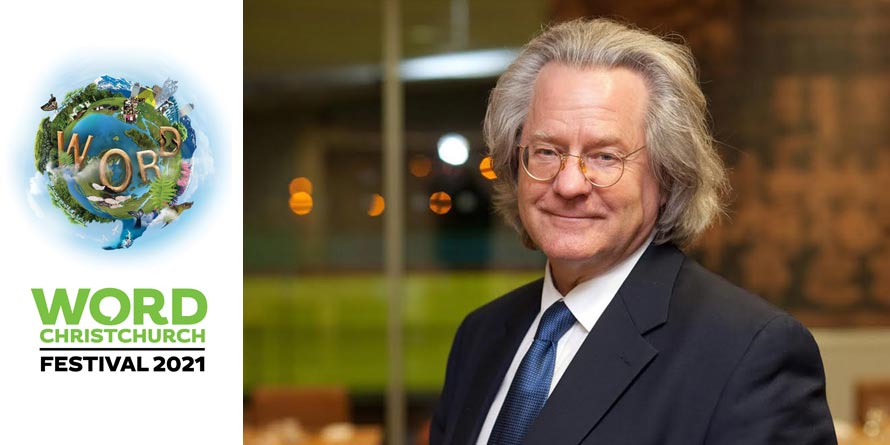A. C. Grayling is one of the great public intellectuals of our time, so it was an opportunity not be missed to see him at the Faraway Near at WORD Christchurch Festival yesterday. Recently, I’ve been dipping in and out of his magisterial book The History of Philosophy (as I did in my late teens with Bertrand Russell’s opus on the same topic), so I was keen to attend.
The event was hosted by Kim Hill who introduced Grayling as a kind of Magic 8-Ball who you could ask anything, and he would know the answer. He certainly covered a lot of ground, from particle physics and cosmology to archaeology and philosophy. He made the point that almost everything we know has been discovered in the three generations since the time his when his grandfather was at school in the late 19th century. Despite the enormous amount we have learnt though, it all applies to a mere 5% of the universe, the remaining 95% consisting of dark matter and dark energy, about which we know almost nothing at all.
Grayling told us that us our knowledge grows, so does our ignorance. The more we discover, the more questions arise, and the more there is to learn. Earlier in the year, in a radio interview with Jim Mora, he said:
“Imagine that you're on an island which is growing in the midst of the ocean. Well as your island grows that's the growth of our knowledge, so your shoreline gets longer and longer. That's the frontier of knowledge.”
This is the theme, and that title, of Grayling’s latest book The Frontiers of Knowledge and for Grayling it’s a reason for excitement rather than despondency because it means that humanity is just at the beginning of its great intellectual journey and the opportunities for new knowledge are limitless. Grayling spoke with enormous passion and enthusiasm about this, and it clearly means a lot to him, which was delightful to watch.
Questions inevitably turned to more immediate concerns, such as what we can do to improve political decision making. At the individual level, Grayling sees this as a matter of education, and in particular the teaching of critical thinking skills. He quoted T. S. Eliot, who said “There is no method but to be very intelligent”. I took him to mean not that we should all aspire to the dizzy heights of his own intellectual accomplishments, but rather that we should all use the intelligence we have and do the hard work of applying it to the difficult problems that we face. This requires us to resist an easy retreat into unthinking ideology, dogma, faith, or appeals to a God of the gaps.
He made the point that when people are asked why they hold particular views, they often don’t have a reasoned answer, but an emotional feeling. The ‘why’ question forces them to rationalise an answer, which may have very little to do with the matter. He gave the example of people who voted leave in the UK Brexit referendum citing that they ‘wanted the old lightbulbs back’, or ‘there’s too much football on telly’ as their reasons for doing so. If we regard these post-hoc rationalisations as genuine, and try to reason against them, then we’re wasting our time as we may win the argument, but we won’t change the way those people feel.
For Grayling, this is more than just abstract philosophical debate. Critical of education in the UK, he has established a private college of higher education to teach his own brand of critical thinking, with courses taught by some of the most influential hard-hitters of the academic world, including a course in science literacy taught by Richard Dawkins, Steven Pinker, and Daniel Dennett.
At the society level, Grayling seems to be arguing for a strengthening of democracy. He is a big fan of proportional representation and constitutional reform, and seems to have great faith in humanity to find the solutions it needs if everyone is granted an equal voice. When asked about vaccine mandates, he replied that there are many ways that people contribute to the common good at their own expense. People understand the need for taxes and are generally prepared to pay them, and he sees things like vaccine mandates in a similar way.
Grayling has another book coming out next year called ‘For The Good of the World’ that will cover some of these issues in more detail. (Covid lockdowns have given him more for time for writing, but he has always been a prolific author.) His next book will tackle three big issues: climate change, technology, and justice, and judging from yesterday’s event, it will be something to look forward to. The subtitle of his new book is ‘Is a Universal Ethics Possible?’. “Is it?” asked Kim. “Only if we can become more democratic” was Grayling’s reply, adding with uncharacteristic pessimism “…so probably not”.
A. C. Grayling was talking to Kim Hill about his new book…
He has published many other books including…
WORD Christchurch
- WORD Christchurch website (for the full programme and info about authors)
- Our coverage of WORD Christchurch Festival 2021 and WORD Christchurch
- Follow WORD on Twitter, Facebook, and Instagram




Add a comment to: A. C. Grayling surveys the frontiers of knowledge at WORD Christchurch Festival 2021